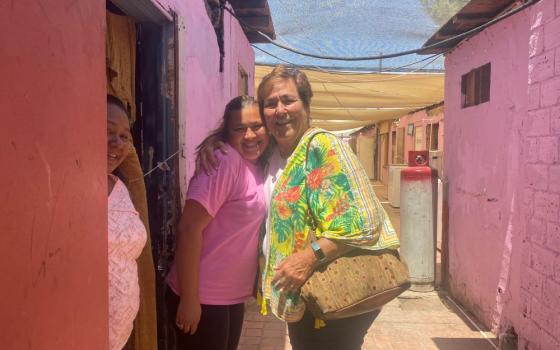
People pray at the site of the radio station where a broadcaster remained to warn others and died herself during the 2011 tsunami. (Janice McLaughlin)
This spring marks the fourth anniversary of the triple disaster that hit the northeast coast of Japan. First, there was a powerful earthquake, followed by a tidal wave or tsunami that swept away people, homes, cars, anything in its path. Then there was the disaster at the nuclear power plant in Fukushima that sent radiation into the air and water, forcing thousands of people to flee the area, abandoning homes, businesses, farms and the comfortable life they had known in a relatively prosperous area.
A year after the tragedy, I went to the region as president of the Maryknoll Sisters to extend sympathy and to be in solidarity with the survivors and those who were assisting them.
As I gazed over acres of rubble and watched cranes painstakingly separate the debris into piles of metal, wood and stone, I could think only of the passage in Scripture where Jesus weeps over the city of Jerusalem. In the face of such death and destruction, my tears flowed as I tried to comprehend the loss and comfort the survivors.
We stopped at a shrine that had been erected at the shell of a building that had housed a radio station. People came to pray in thanksgiving for a heroic broadcaster who stayed at her post to warn people to flee to higher ground, until the tsunami swept her away.
We visited a family high in the mountains who told us of their fears that day when the husband had gone into the forest to work. His wife, who is from the Philippines, did not know if he was alive or dead, and he feared the worst for her, their son and his father who had remained in the house. Tears flowed as they shared their joy at being safe and together again.
Amid the tears at Fukushima, I met committed activists working to expose the dangers of nuclear energy and to close the 52 nuclear power plants that are located throughout the country.
In the coastal cities that had been devastated by the earthquake and tsunami, I met volunteers from all parts of Japan coming to assist their brothers and sisters in the northeast through Caritas Japan. Catholics and Buddhists labor side by side, living in simple prefabricated structures and going out daily to support the traumatized people who remain.
"At first, Caritas provided shelter, food, clothing and blankets," Maryknoll Sr. Kathleen Reiley, who assists traumatized children, told me. "Now the basic needs have been met, but there is another kind of support that we provide. It might be giving hand massages to the elderly, playing games with the children, repairing nets with fishermen, or cooking meals with the women. And all the time we listen to the heartbreaking stories of loss and survival."
She went on to explain that it's a Japanese virtue to endure suffering, but many people contemplated suicide when they realized how much they had lost. "Now they have a reason to hope," she said.
The weeks after we celebrate Easter remind us that the God who suffered and died for us is still present in our suffering. Even amid destruction and despair, the promise of resurrection offers hope of new life.
In both the Old and New Testament, we are reminded that God does not desire sackcloth and ashes, but justice for the oppressed and help to widows and orphans (Isaiah 1:11-17).
"Fast by sharing your food with the hungry," the prophet Isaiah tells us. "Bring to your house the homeless, clothe the person you see naked and do not turn away from your own kin" (Isaiah 58:7).
The people of Japan have reached out to their neighbors who have lost everything. They have responded generously, not just with donations but by accompanying those in need -- whether for a week, a month or more.
What causes me to weep? What do I see with the eye of my soul when I behold those in need? Do I understand what St. Paul meant: "If one part suffers, every part suffers with it; if one part is honored, every part rejoices with it" (1 Corinthians 12:26)? What is the sacrifice I will make for others so that this year's holy season will endure and bring wholeness to the body of Christ?
[Maryknoll Sr. Janice McLaughlin has spent almost 40 years in East and Southern Africa in the fields of journalism, adult education, and conflict transformation. She was a political prisoner in colonial Rhodesia and is the author of several books, including Ostriches, Dung Beetles, and Other Spiritual Masters: A Book of Wisdom from the Wild.]




